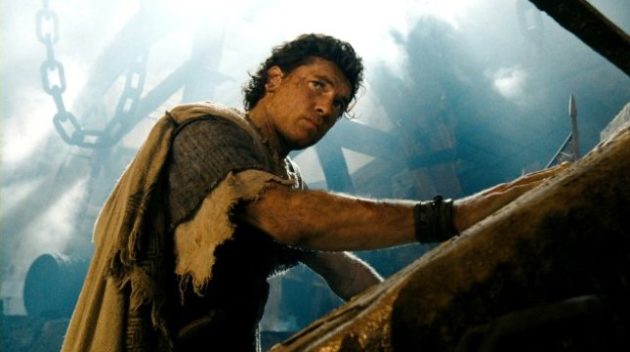REVIEW: Wrath of the Titans Delivers the Gods, If Not the Goods

The 10 years that we are told at the beginning of Wrath of the Titans have passed since Perseus (Sam Worthington) defeated the Kraken may not seem like long enough, especially when you consider that it’s only been two since the Clash of the Titans remake was released, Kraken-like, on an unsuspecting populace. It was sufficient time, anyway, for Worthington to grow out his hair, so that in Wrath of the Titans he sports a soft cap of curls to go with his peaceful life among the humans. He’s lost a wife but gained a son and another pretext to propel a franchise whose fate was sealed once Avatar’s numbers started rolling in. That it was going to happen was certain; how it happened was of secondary concern.
Greek mythology feels particularly ill-used as a framework for narrative standards this low. Wrath (and who knows the source of the titular rage, they’re just mad, OK?) uses some of the names we now know third- or fourth-hand (I’m not sure where I’d be without The Mighty Hercules, which feels like an AP Classics course by comparison) and adds a few faintly recognizable accoutrements — Zeus’s thunderbolt, Pegasus — in what plays out as a generic “save the world” plot. Demigod Perseus is being called back to the realm of the gods by his father, Zeus (Liam Neeson) to help stem the weakening of his powers caused by waning human devotion. Perseus’s jealous brother Ares (Édgar Ramírez, from Carlos) had turned to the dark side and Hades (Ralph Fiennes) is still rotting in hell, along with his (and Zeus’s) father, Kronos, who is threatening to unleash his wrath on the world, presumably because his “voice” is indistinguishable from that of an 8-year old burping the alphabet. I’d be mad too.
The set-up is put across in the strictest expositional terms. The real progression here is one of firepower — specifically the movement from fireballs that streak across the screen to fire clouds that fill the heavens and everything below. Director Jonathan Liebesman (Battle: Los Angeles) brings his signature frenetic pacing to the table, starting the CGI thrashings immediately and growing less and less concerned about whether the story keeps up. The animating theme — Perseus’s ambivalence about his father and his powers — is dispatched in perfunctory doses between disorienting battles with fire-breathing beasts. When he expresses doubts about helping his father, the raffish Agenor (Toby Kebbell), son of Poseidon (played, briefly, by Danny Huston), clears them up with this reply: “Yesterday I was in chains, today I’m here, trying to save the universe. Jump in.”
An action/effects showcase like this one is not the place to turn for nuanced characterization, but the script (by Dan Mazeau and David Leslie Johnson, story by Greg Berlanti) seems to defy even the few opportunities it has to make us care. Even the occasional swipes at campy self-awareness (“Don’t give me the big speech,” Agenor says at a critical moment; “Eh, I wasn’t planning to,” Worthington replies) feel tossed off, rather than part of developing an actual tone.
It would be a real shame, with this much money and this many effects artists, if there were not a few purely visual wows. Wrath manages exactly two, and not where you might expect. The first is in the form of Rosamund Pike, who plays Andromeda (re-cast since the previous film), warrior queen of the whatever. With her bluebird eyes and regal bearing, Pike manages to telegraph human warmth and pull off a sculpted boob plate at the same time. And it is a welcome surprise that rather than the usual stamping, earth-shuddering, many-mouthed thingies inevitably dreamed up in computer bays to terrorize heroes like this one, the most frightening is basically a giant, one-eyed dude. A showdown with a Cyclops and his pals is genuinely thrilling and proceeds with relative coherence. After that the gang finds the dotty fallen god Hephaestus (Bill Nighy), a sort of vintage arms dealer, and for a few minutes Wrath starts to cruise along like it's actually going somewhere.
That feeling is brief, and before long we're back to a few anodyne exchanges (Neeson and Fiennes seem particularly glib, swinging their beards around in a movie they’ll never watch) between fetishized explosions. “This is where people used to come to worship the gods,” Perseus says to his franchise-extending young son (John Bell) as they pick through a temple in disarray. Yeah, my thoughts exactly.
Follow Michelle Orange on Twitter.
Follow Movieline on Twitter.

Comments
I love Orange reviews. This one has two gems:
- '...his “voice” is indistinguishable from that of an 8-year old burping the alphabet.'
- '...swinging their beards around in a movie they’ll never watch.'
I had low expectations for this sequel. Seems like that instinct was correct.